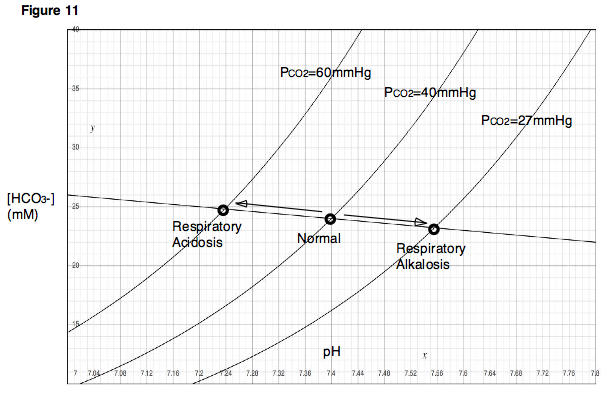- Respiratory alkalosis
Infobox_Disease
Name = Respiratory alkalosis

Caption =Davenport diagram
DiseasesDB = 406
ICD10 = ICD10|E|87|3|e|70
ICD9 = ICD9|276.3
ICDO =
OMIM =
MedlinePlus = 000111
eMedicineSubj = med
eMedicineTopic = 2009
MeshID = D000472Respiratory alkalosis results from increased alveolar respiration (
hyperventilation ) leading to decreased plasmacarbon dioxide concentration. This leads to decreased hydrogen ion andfreely ionized blood calcium concentrations.Types
There are two types of respiratory alkalosis: chronic and acute.
* In "acute respiratory alkalosis", increased levels of carbon dioxide are "blown off" by the lungs, which are hyperventilating. During acute respiratory alkalosis, the person may lose consciousness where the rate of ventilation will resume to normal.
* In "chronic respiratory alkalosis", for every 10 mM drop in pCO2 in blood, there is a corresponding 5 mM of bicarbonate ion drop. The drop of 5 mM of bicarbonate ion is a compensation effect which reduces the alkalosis effect of the drop in pCO2 in blood. This is termed metabolic compensation.
Causes
Causes of the alveolar hyperventilation seen in respiratory alkalosis include:
*anxiety ,hysteria and stress
* moving intohigh altitude areas, when the low atmospheric pressure of oxygen stimulates increased ventilation
*pyrexia in fever, which stimulates the respiratory centre in the brainstem
* drugs, includingdoxapram and large doses ofaspirin , which also stimulate the respiratory centre
*CNS causes, includingstroke ,subarachnoid haemorrhage ,meningitis
*pregnancy
* a hypoxic drive in lung disease, such aspneumonia
*caffeine overdose andcoffee abuseIn addition, a respiratory alkalosis is often produced accidentally by doctors (
iatrogenic ally) duringmechanical ventilation of patients.ymptoms
Symptoms of respiratory alkalosis are related to the decreased blood carbon dioxide levels, and include peripheral
paraesthesiae . In addition, the alkalosis may disrupt calcium ion balance, and cause the symptoms ofhypocalcaemia (such as tetany andfainting ) with no fall in total serum calcium levels.ee also
*
Metabolic alkalosis
*Respiratory acidosis
*Hypocalcemia
Wikimedia Foundation. 2010.
